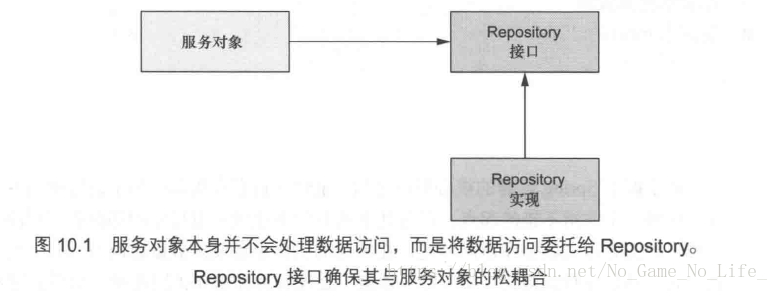Spring Data
- Spring的数据访问哲学

Spring的数据访问异常体系
SQLException
- 提供了挺多的异常
- 数据访问模板化
配置数据源
- 使用JNDI
- 使用数据源连接池
@Beanpublic DataSource dataSource(){ DruidDataSource dataSource = new DruidDataSource(); dataSource.setDriverClassName("com.mysql.cj.jdbc.Driver"); dataSource.setUsername("root"); dataSource.setPassword("Root@@715711877"); dataSource.setUrl("jdbc:mysql:///manage"); return dataSource;}- 使用嵌入式数据源
使用profile选择数
@Profile("product") @Bean public DataSource dataSource(){ DruidDataSource dataSource = new DruidDataSource(); dataSource.setUrl("jdbc:h2:~/test"); return dataSource; } @Profile("dev") @Bean public DataSource dataSourceDev(){ DruidDataSource dataSource = new DruidDataSource(); dataSource.setDriverClassName("com.mysql.cj.jdbc.Driver"); dataSource.setUsername("root"); dataSource.setPassword("Root@@715711877"); dataSource.setUrl("jdbc:mysql:///manage"); return dataSource; }在Spring 当中使用JDBC
JDBC模板
JdbcDaoSupport
update():执行DML语句。增、删、改语句
queryForMap():查询结果将结果集封装为map集合,将列名作为key,将值作为value 将这条记录封装为一个map集合
- 注意:这个方法查询的结果集长度只能是1
queryForList():查询结果将结果集封装为list集合
- 注意:将每一条记录封装为一个Map集合,再将Map集合装载到List集合中
query():查询结果,将结果封装为JavaBean对象
query的参数:RowMapper
- 一般我们使用BeanPropertyRowMapper实现类。可以完成数据到JavaBean的自动封装
- new BeanPropertyRowMapper<类型>(类型.class)
queryForObject:查询结果,将结果封装为对象
- 一般用于聚合函数的查询
配置模板
@Bean public JdbcTemplate jdbcTemplate(){ JdbcTemplate jdbcTemplate = new JdbcTemplate(); jdbcTemplate.setDataSource(dataSourceDev()); return jdbcTemplate; }- 执行操作
@org.springframework.stereotype.Servicepublic class Service { @Autowired private JdbcTemplate jdbcTemplate; public void insert(Admin admin){ jdbcTemplate.update("INSERT INTO admin(username,password) VALUES(?,?)", admin.getUsername(), admin.getPassword()); }}使用Lambda表达式
jdbcTemplate.query("select * from admin",r->{ do{ System.out.println( r.getString("username")+"||"+r.getString("password") ); }while (r.next());});使用命名参数
public void insert(Admin admin){ jdbcTemplate.update("INSERT INTO admin(username,password) VALUES(:username,:password)", Map.of("username",admin.getUsername(), "password",admin.getPassword()));}JPA
需要的一些复杂特性
- 延迟加载
- 预先抓取
- 级联
集成 Hibernate
Spring与JAVA持久化API
- 配置实体管理器工厂
@Configuration@ComponentScan("wang.ismy.spring")@EnableJpaRepositories(basePackages = "wang.ismy.spring",entityManagerFactoryRef = "entityManagerFactoryBean")public class Config { @Bean public DataSource dataSourceDev(){ DruidDataSource dataSource = new DruidDataSource(); dataSource.setDriverClassName("com.mysql.cj.jdbc.Driver"); dataSource.setUsername("root"); dataSource.setPassword("Root@@715711877"); dataSource.setUrl("jdbc:mysql:///manage"); return dataSource; } @Bean public LocalContainerEntityManagerFactoryBean entityManagerFactoryBean(DataSource dataSource, JpaVendorAdapter adapter){ LocalContainerEntityManagerFactoryBean bean = new LocalContainerEntityManagerFactoryBean(); bean.setDataSource(dataSource); bean.setJpaVendorAdapter(adapter); bean.setPackagesToScan("wang.ismy.spring"); return bean; } @Bean public JpaVendorAdapter jpaVendorAdapter(){ HibernateJpaVendorAdapter adapter = new HibernateJpaVendorAdapter(); adapter.setDatabase(Database.MYSQL); adapter.setGenerateDdl(false); adapter.setDatabasePlatform("org.hibernate.dialect.MySQL5InnoDBDialect"); return adapter; } @Bean(name = "transactionManager") public PlatformTransactionManager transactionManager(EntityManagerFactory bean, DataSource dataSource) { JpaTransactionManager tm = new JpaTransactionManager(); tm.setEntityManagerFactory(bean); tm.setDataSource(dataSource); return tm; }}<?xml version="1.0" encoding="UTF-8"?><beans xmlns="http://www.springframework.org/schema/beans" xmlns:xsi="http://www.w3.org/2001/XMLSchema-instance" xmlns:jpa="http://www.springframework.org/schema/data/jpa" xsi:schemaLocation="http://www.springframework.org/schema/beans https://www.springframework.org/schema/beans/spring-beans.xsd http://www.springframework.org/schema/data/jpa https://www.springframework.org/schema/data/jpa/spring-jpa.xsd"> <jpa:repositories base-package="wang.ismy.jms" transaction-manager-ref="transactionManager" entity-manager-factory-ref="entityManagerFactory"/> <bean id="transactionManager" class="org.springframework.orm.jpa.JpaTransactionManager"> <property name="entityManagerFactory" ref="entityManagerFactory"/> </bean> <bean id="dataSource" class="com.alibaba.druid.pool.DruidDataSource"> <property name="username" value="root"/> <property name="password" value="123"/> <property name="driverClassName" value="com.mysql.cj.jdbc.Driver"/> <property name="url" value="jdbc:mysql:///ssm"/> </bean> <bean id="entityManagerFactory" class="org.springframework.orm.jpa.LocalContainerEntityManagerFactoryBean"> <property name="dataSource" ref="dataSource"/> <!--扫描实体类--> <property name="packagesToScan" value="wang.ismy.jms"/> <!--服务提供者--> <property name="persistenceProvider"> <bean class="org.hibernate.jpa.HibernatePersistenceProvider"/> </property> <!--服务提供者适配器--> <property name="jpaVendorAdapter"> <bean class="org.springframework.orm.jpa.vendor.HibernateJpaVendorAdapter"> <property name="generateDdl" value="false" /> <property name="database" value="MYSQL" /> <property name="databasePlatform" value="org.hibernate.dialect.MySQLDialect" /> <property name="showSql" value="true" /> </bean> </property> <!--高级特性--> <property name="jpaDialect"> <bean class="org.springframework.orm.jpa.vendor.HibernateJpaDialect"/> </property> </bean></beans>- 从JNDI中获取实体管理器工厂
编写基于JPA的Repository
- 实体类
@Data@Entity@Table(name = "admin")public class Admin { @Id @GeneratedValue(strategy = GenerationType.IDENTITY) private Integer id; private String username; private String password;}- Repository类
public interface AdminRepository extends JpaRepository<Admin,Integer> { }- 使用
adminRepository.findAll();自定义查询方法
public interface AdminRepository extends JpaRepository<Admin,Integer> { Admin findbyUsername(String username);}- 一些关键词
| Keyword | Sample | JPQL |
|---|---|---|
| And | findByLastnameAndFirstname | ... where x.lastname = ?1 and x.firstname = ?2 |
| Or | findByLastnameOrFirstname | ... where x.lastname = ?1 or x.firstname = ?2 |
| Is,Equals | findByFirstnameIs,findByFirstnameEquals | ... where x.firstname = ?1 |
| Between | findByStartDateBetween | ... where x.startDate between ?1 and ?2 |
| LessThan | findByAgeLessThan | ... where x.age < ?1 |
| LessThanEqual | findByAgeLessThanEqual | ... where x.age ⇐ ?1 |
| GreaterThan | findByAgeGreaterThan | ... where x.age > ?1 |
| GreaterThanEqual | findByAgeGreaterThanEqual | ... where x.age >= ?1 |
| After | findByStartDateAfter | ... where x.startDate > ?1 |
| Before | findByStartDateBefore | ... where x.startDate < ?1 |
| IsNull | findByAgeIsNull | ... where x.age is null |
| IsNotNull,NotNull | findByAge(Is)NotNull | ... where x.age not null |
| Like | findByFirstnameLike | ... where x.firstname like ?1 |
| NotLike | findByFirstnameNotLike | ... where x.firstname not like ?1 |
| StartingWith | findByFirstnameStartingWith | ... where x.firstname like ?1 (parameter bound with appended %) |
| EndingWith | findByFirstnameEndingWith | ... where x.firstname like ?1 (parameter bound with prepended %) |
| Containing | findByFirstnameContaining | ... where x.firstname like ?1 (parameter bound wrapped in %) |
| OrderBy | findByAgeOrderByLastnameDesc | ... where x.age = ?1 order by x.lastname desc |
| Not | findByLastnameNot | ... where x.lastname <> ?1 |
| In | findByAgeIn(Collection ages) | ... where x.age in ?1 |
| NotIn | findByAgeNotIn(Collection age) | ... where x.age not in ?1 |
| TRUE | findByActiveTrue() | ... where x.active = true |
| FALSE | findByActiveFalse() | ... where x.active = false |
| IgnoreCase | findByFirstnameIgnoreCase | ... where UPPER(x.firstame) = UPPER(?1) |
- 使用SQL
@Query(value = "SELECT * FROM admin WHERE username = 'admin'",nativeQuery = true)Admin selfCondition();- 使用JPQL
@Query("FROM Customer WHERE custName = ?1")List<Customer> findByJPQL(String name);// 更新操作@Query("UPDATE Customer SET custName = ?2 WHERE custId = ?1")@Modifyingint update(Long id,String name);动态查询
JpaSpecificationExecutor
Specification
- 示例
Specification<Customer> spec = (Specification<Customer>) (root/*比较的属性*/, query, cb/*查询方式*/) -> { Path<Object> custName = root.get("custName"); return cb.equal(custName,"老王八");};Optional<Customer> one = repository.findOne(spec);System.out.println(one.get());- 条件拼接
Specification<Customer> spec = (Specification<Customer>) (root/*比较的属性*/, query, cb/*查询方式*/) -> { Path<Object> custName = root.get("custName"); Path<Object> custIndustry = root.get("custIndustry"); var p1 = cb.equal(custName,"老王八"); var p2 = cb.equal(custIndustry,"隔壁"); return cb.and(p1,p2);};- 模糊查询
Specification<Customer> spec = (Specification<Customer>) (root/*比较的属性*/, query, cb/*查询方式*/) -> { Path<Object> custName = root.get("custName"); return cb.like(custName.as(String.class),"%老%");};repository.findAll(spec).forEach(System.out::println);- 排序
repository.findAll(spec, new Sort(Sort.Direction.DESC,"custId")).forEach(System.out::println);- 分页
repository.findAll(PageRequest.of(0,3)).forEach(System.out::println);Page接口
public interface Page<T> extends Slice<T> { static <T> Page<T> empty() { return empty(Pageable.unpaged()); } static <T> Page<T> empty(Pageable pageable) { return new PageImpl<>(Collections.emptyList(), pageable, 0); } int getTotalPages(); long getTotalElements(); <U> Page<U> map(Function<? super T, ? extends U> converter);}多表操作
一对多
- 主表
@OneToMany(targetEntity = LinkMan.class)@JoinColumn(name = "lkm_cust_id",referencedColumnName = "cust_id")private Set<LinkMan> linkMan = new HashSet<>(0);- 从表
@ManyToOne(targetEntity = Customer.class)@JoinColumn(name = "lkm_cust_id",referencedColumnName = "cust_id")private Customer customer;- 操作
Customer customer = new Customer();customer.setCustName("20190908");LinkMan man = new LinkMan();man.setLkmName("小婊砸");man.setCustomer(customer);customerRepository.save(customer);linkManRepository.save(man);- 放弃外键维护
@OneToMany(mappedBy = "customer")- 级联添加
@OneToMany(mappedBy = "customer",cascade = CascadeType.ALL)Customer customer = new Customer();customer.setCustName("20190908");LinkMan man = new LinkMan();man.setLkmName("小婊砸");man.setCustomer(customer);customer.getLinkMans().add(man);customerRepository.save(customer);- 级联删除
Optional<Customer> cus = customerRepository.findById(1L);customerRepository.delete(cus.get());多对多
@ManyToMany(targetEntity = Role.class)@JoinTable(name = "user_role",joinColumns = {@JoinColumn(name = "user_id",referencedColumnName = "user_id")}, inverseJoinColumns = {@JoinColumn(name = "role_id",referencedColumnName = "role_id")})private Set<Role> roleSet = new HashSet<>();@ManyToMany(targetEntity = User.class)@JoinTable(name = "user_role",joinColumns ={@JoinColumn(name = "role_id",referencedColumnName = "role_id")}, inverseJoinColumns = {@JoinColumn(name = "user_id",referencedColumnName = "user_id")})private Set<User> userSet = new HashSet<>();User user = new User();user.setUsername("老王");Role role = new Role();role.setRoleName("隔壁");user.getRoleSet().add(role);userDao.save(user);roleDao.save(role);- 级联
对象导航
public enum FetchType { LAZY,EAGER}缓存数据
启用缓存支持
@Configuration@ComponentScan("wang.ismy.spring")@EnableCachingpublic class Config { @Bean public CacheManager cacheManager(){ return new ConcurrentMapCacheManager(); }}- Spring 提供的几个缓存管理器 
让方法支持缓存
@Cacheable(value = "find",key = "#id")public String find(Integer id){ System.out.println("real find"); return "hello world"+id;}将值放到缓存当中
/*** 该方法肯定会被执行,但是返回结果会放到缓存当中*/@CachePut(value = "find",key = "#id")public String put(Integer id){ return "new"+id;}条件化缓存
- unless : 阻止将对象放入缓存,但是还会进行缓存查找
- condition : 不会进行缓存查找,也不会将结果放入缓存
在id等于10时不会进行缓存
@Cacheable(value = "find",key = "#id",condition = "#id != 10")public String find(Integer id){ System.out.println("real find"); return "hello world"+id;}- 移除缓存
@CacheEvict(value = "find",key = "#id")public void remove(Integer id){}